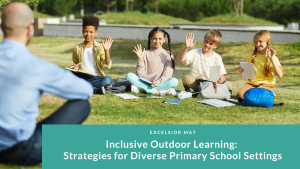Inclusive Outdoor Learning: Strategies for Diverse Primary School Settings

Education is not one-size-fits-all. It's a truth?? that we, as a Multi Academy Trust, must embrace fully. Every pupil brings a unique set of abilities, backgrounds and experiences to the classroom. It is no different when we step outside into the world of outdoor learning. In this article, we explore the significance of inclusive outdoor learning and offer strategies for creating diverse primary school settings where all pupils can thrive.
Understanding Inclusive Outdoor Learning
Inclusive outdoor learning is an educational approach that ensures all pupils, regardless of their abilities or differences, have the opportunity to engage with the natural world. It is about fostering a sense of belonging and participation in outdoor activities, regardless of individual challenge. Our Trust schools provide lots of outdoor learning opportunities to our pupils. For example, Year 5 pupils learn about Fire Safety and toast marshmallow around the campfire, Nursery pupils have a nature walk to our school allotment and all pupils have chance to participate in a wide range of Sports competitions.
Benefits of Inclusivity in Outdoor Learning
Social Integration: Inclusive outdoor learning promotes social interactions and friendships among pupils from diverse backgrounds, enhancing their interpersonal skills. Pupils with language challenges could communicate through outdoor experiences. It also matches with the values of our “No Outsiders” Programme (https://www.excelsiormat.org/no-outsiders/) which is promoting community cohesion.
Increased Confidence: Pupils gain confidence as they overcome challenges in the outdoor and new environment, contributing to a positive self-image.
Enhanced Learning: Inclusivity fosters a wider range of perspectives and problem-solving skills, contributing to enhanced learning outcomes. Pupils from different cultural backgrounds sharing their traditions in the great outdoors.
Improved Well-Being: Spending time outdoors has proven benefits for the physical and mental well-being of pupils. For example, being in a natural environment has been linked to reduced stress and improved mental health.
Preparation for Life: Preparing primary school pupils for the real world, where diversity is the norm, is a vital aspect of inclusive outdoor learning.
Strategies for Inclusive Outdoor Learning
Adapted Activities: Modify outdoor activities to accommodate different abilities of pupils. For example, pupils with mobility challenges can still participate in nature walks with the help of adapted equipment.
Peer Support: Encourage peer support and co-operation. Pupils can work in pairs or small groups where each member has a specific role, fostering teamwork and mutual aid.
Diverse Materials: Provide a range of materials and resources for sensory exploration. Incorporate tactile, visual, and auditory elements into outdoor activities.
Clear Communication: Ensure that instructions and communication of teachers are clear, using visual aids or sign language as necessary. This supports pupils with diverse communication needs.
Multiple Pathways: Recognise that there are various ways to engage with outdoor learning. Some pupils may prefer hands-on activities, while others may excel in observation or documentation.
Professional Development: Invest in training for teachers and outdoor educators on inclusive practices. This includes understanding diverse needs and effective strategies.
Collaboration: Work closely with families and specialists to tailor outdoor learning experiences to individual pupils' requirements.
